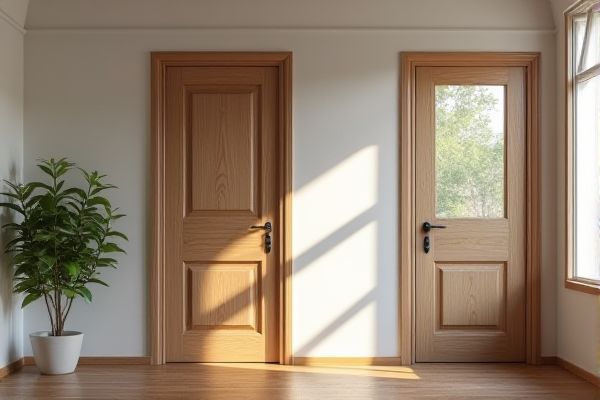
A solid door offers enhanced privacy, security, and insulation, making it ideal for entryways where protection and energy efficiency are priorities, while a windowed door allows natural light to enter and improves visibility, creating a more open and inviting atmosphere. Understanding the benefits and drawbacks of each can help you choose the perfect door for your space--explore the rest of the article to find out which option suits your needs best.
Table of Comparison
| Feature | Solid Door | Windowed Door |
|---|---|---|
| Privacy | High privacy, no visibility | Moderate privacy, partial visibility |
| Natural Light | No natural light | Allows natural light |
| Security | Enhanced security and durability | Less secure due to glass panel |
| Insulation | Better thermal and sound insulation | Reduced insulation because of glass |
| Aesthetics | Classic, solid appearance | Modern and stylish look |
| Maintenance | Easy to maintain | Requires glass cleaning and care |
| Cost | Generally lower cost | Higher cost due to glass |
Introduction to Solid and Windowed Doors
Solid doors provide enhanced privacy, security, and insulation due to their sturdy, uninterrupted surface, making them ideal for exterior entrances and rooms requiring soundproofing. Windowed doors incorporate glass panels, allowing natural light to enter and creating a visual connection between spaces, which benefits interior living areas and offices. Choosing between solid and windowed doors depends on your needs for privacy, light transmission, and aesthetic preference.
Key Differences Between Solid and Windowed Doors
Solid doors provide superior privacy, enhanced security, and better insulation compared to windowed doors, making them ideal for exterior entrances or rooms requiring privacy. Windowed doors incorporate glass panels, allowing natural light to pass through while offering some level of visibility, which can visually enlarge interior spaces and improve ambiance. The choice between solid and windowed doors depends largely on the balance between security, privacy, natural light, and aesthetic preferences for specific applications.
Pros and Cons of Solid Doors
Solid doors offer enhanced security and better insulation compared to windowed doors, making them ideal for privacy and energy efficiency in your home. Their durability and resistance to weather conditions reduce maintenance needs, but they lack natural light and visual connection to the outside. Choosing solid doors supports improved soundproofing, though it may create a darker interior space.
Advantages and Disadvantages of Windowed Doors
Windowed doors enhance natural light infiltration and improve visibility, promoting a more open and inviting atmosphere. They offer aesthetic appeal and help reduce the need for artificial lighting, contributing to energy savings. However, windowed doors may compromise privacy and security compared to solid doors, and are typically less insulated, which can impact thermal efficiency.
Security Comparison: Solid vs. Windowed Doors
Solid doors offer superior security compared to windowed doors due to their lack of glass panels, which are vulnerable points for break-ins. The robust construction of solid doors resists forced entry and provides higher impact resistance, making them ideal for exterior entryways. Windowed doors, while aesthetically appealing, compromise security by allowing potential intruders to see inside and break the glass to unlock the door.
Aesthetics and Design Considerations
Solid doors offer a timeless, clean look that enhances privacy and security, making them ideal for minimalist or traditional design schemes. Windowed doors bring natural light into your space and create an inviting atmosphere, blending functionality with aesthetic appeal through various glass styles and frame options. Choosing between solid and windowed doors depends on your design priorities, whether emphasizing light, visibility, or a more uniform facade.
Energy Efficiency: Insulation and Thermal Performance
Solid doors typically offer superior energy efficiency due to their dense core materials, providing enhanced insulation and reducing heat transfer compared to windowed doors. Windowed doors, while aesthetically pleasing, often incorporate glass panels that can lower thermal performance unless they feature double or triple glazing with low-emissivity coatings. To maximize your home's insulation and thermal performance, selecting a solid door or a windowed door with energy-efficient glass options is essential.
Privacy and Soundproofing Aspects
Solid doors provide superior privacy and soundproofing due to their dense construction, effectively blocking noise and preventing visibility. Windowed doors, while allowing natural light, compromise privacy and transmit more sound, making them less ideal for spaces requiring quiet and seclusion. Your choice depends on balancing the need for sound insulation and privacy against the desire for light and openness.
Maintenance and Durability Factors
Solid doors offer superior durability and require less frequent maintenance due to their robust construction and resistance to weather-related damage. Windowed doors can be more susceptible to wear and potential damage from glass breakage, demanding regular inspection and upkeep to maintain seal integrity and appearance. Choosing a solid door can reduce long-term maintenance efforts, ensuring your entryway remains secure and resilient for years.
Choosing the Right Door for Your Space
Solid doors provide enhanced privacy, security, and insulation, making them ideal for bedrooms, bathrooms, and exterior entrances. Windowed doors allow natural light to flow through your space, creating an open and inviting atmosphere while reducing the need for artificial lighting. Your choice depends on balancing privacy needs with the desire for light and visual connection within your environment.
 homyna.com
homyna.com